As garden owners, we often face unwelcome visits from feline friends who see our green spaces as their own personal litter box. It can be quite frustrating to clean up after them.
One common home remedy mentioned frequently in various forums is the use of bleach. The burning question is: “Does bleach stop cats pooping in garden?”
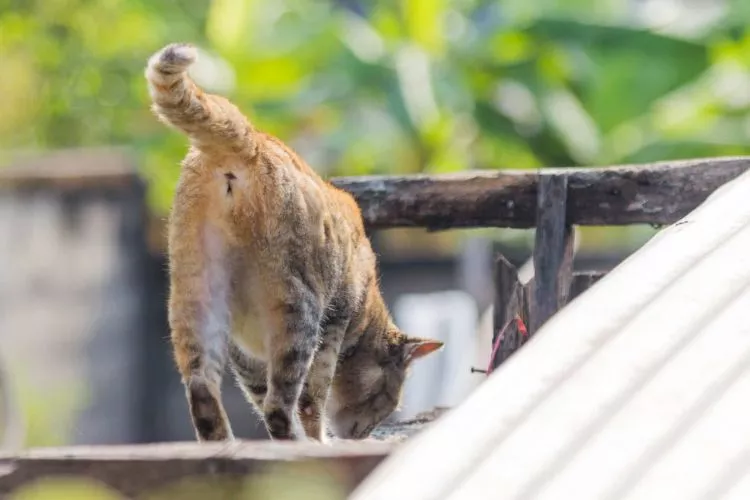
This article will explore this topic in an accessible yet professional manner, examining the validity of this claim, how safe it is for both cats and your garden, and providing scientifically backed alternatives if bleach is found to be ineffective or harmful.
Join us as we dig into this intriguing question, with the aim of providing a solution that strikes a balance, respecting the well-being of our feline neighbors while preserving the cleanliness and integrity of our gardens.
🐾 Does bleach stop cats pooping in garden?
Yes, bleach may deter cats from using your garden as a restroom in the short term. However, it’s not a recommended solution due to its toxicity and harmful effects on both the environment and the cats themselves.
Beyond posing a danger to cats if ingested, bleach can also harm beneficial bacteria and plants in your garden.
Humane alternatives, such as utilizing citrus or pepper sprays, implementing motion-activated sprinklers, or placing aluminum foil or rocks around your plants can be highly effective. Using bleach to address this issue is neither safe nor sustainable in the long run.
🐾 Is bleach harmful to cats?
Yes, bleach is harmful to cats. It presents a significant health danger if a cat ingests or inhales it, or if it comes into contact with their skin. Ingestion of bleach can lead to vomiting and diarrhea, ulcers in the mouth or esophagus, and drooling.
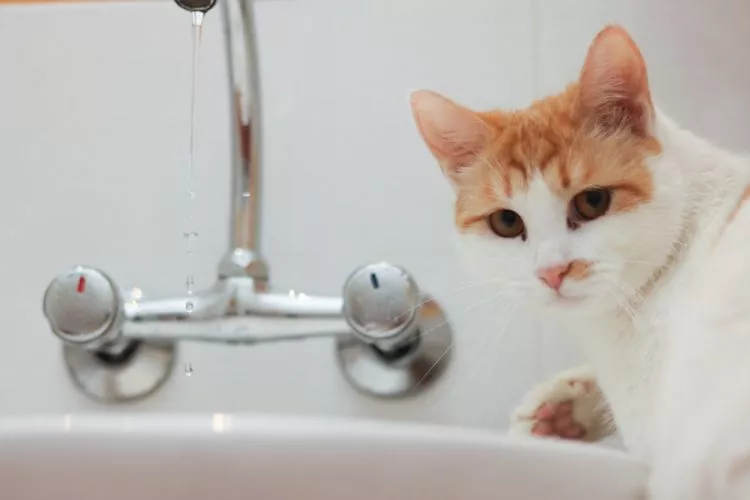
In more severe cases, it can cause significant damage to the respiratory and gastrointestinal systems. Inhalation of bleach fumes can cause sneezing, breathlessness, and eye irritation.
Skin contact can lead to burns or irritation. If a cat walks on a bleach-treated surface and later licks its paws, it can be poisoned. Thus, bleach should be safely stored and its usage in areas accessible to cats should be strictly limited.
🐾 How do I stop cats pooping in my garden permanently?
Cats pooping in your garden can be a rather unpleasant problem. Finding efficient and humane solutions is important for maintaining a clean and flourishing garden. Here’s an in-depth guide on how to deter cats from using your outdoor space as their toilet:
Step 1: Understand the Cats’ Behavior
Before strategizing, it’s important to understand why cats favor particular areas for their business. Cats prefer loose, soft soil – it’s easy for them to dig and cover up afterwards. They’re also creatures of habit and prefer to poop in the same areas.
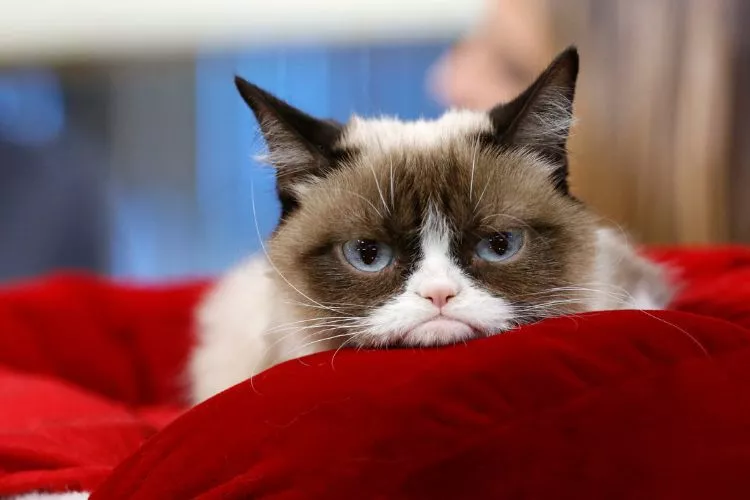
Step 2: Rearrange Your Garden
Making your garden less attractive to cats can be a good first step. Here are some approaches you could take:
- Select Plants Cats Dislike: Cats dislike the smell of some plants, such as Coleus Canina, also known as “Scaredy Cat Plant”, Lavender, Rosemary, and Lemongrass. By incorporating these into your garden, you can create an environment that deters cats.
- Adjust Your Soil: Cats are less likely to defecate in soil that’s hard to dig. Try topping your soil with pebbles, pine cones, or rough mulch.
- Install Netting or Chicken Wire: Laying netting or chicken wire over your flowerbeds can discourage cats. They dislike the impractical surface for digging.
Step 3: Provide Alternatives
If you’re aware of which cats are using your garden and can influence their environment, consider providing an attractive alternative. You could set up a designated sandbox area in your garden. Cats may opt to use this instead of your flowerbeds or lawns.
Step 4: Natural Cat Deterrents
A variety of natural deterrents can be used to discourage cats without causing harm:
- Citrus Peels or Spray: Cats dislike the scent of citrus. Scatter some citrus peels or use a citrus spray in the affected areas.
- Essential Oils: Use cat-repelling essential oils such as lavender, citronella, or peppermint. Make sure to dilute them appropriately as they can be potent.
- Coffee Grounds: They not only deter cats but can also enrich your soil.
- Vinegar Spray: Spray a mixture of equal parts white vinegar and water around the perimeters of your garden. However, avoid spraying it directly onto plants as it can be harmful to them.
Step 5: Use Commercial Repellents
If natural deterrents aren’t working, consider commercial cat repellents. Look for products that are safe, non-toxic, and environmentally friendly.
Step 6: Install Motion-Activated Sprinklers or Ultrasonic Devices
Invest in garden tech like motion-activated sprinklers or ultrasonic devices. These can provide a harmless surprise that discourages cats from visiting your garden often.
In conclusion, while preventing cats from using your garden as their bathroom may require some effort and patience, humane and effective solutions do exist. Always remember to respect the well-being of the cats while finding ways to keep your garden poop-free.
🐾 Home remedies to stop cats pooping in garden?
Controlling cats from pooping in your garden can be a challenge. Luckily, there are several safe, affordable, and effective home remedies at your disposal:
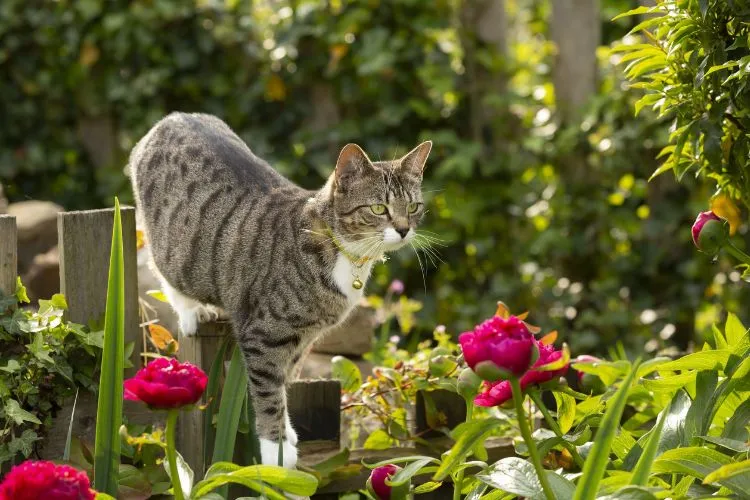
1. Citrus Peels or Spray
Cats generally despise the aroma of citrus fruits such as oranges, lemons, or grapefruits. Scatter fresh citrus peels around your garden, focusing mostly on areas where cats frequent.
Alternatively, you can create a citrus spray by infusing citrus peels in water and leaving the mixture to steep before spraying around the garden.
2. Coffee Grounds
Carefully spread used coffee grounds around your garden. Cats dislike the strong smell of coffee and will most likely keep their distance. As an added bonus, coffee grounds can help to enrich your soil.
3. Vinegar and Water Mixture
Fill a spray bottle with an equal mixture of white vinegar and water, then spray it around the boundaries of your garden. This potent scent can deter cats. However, avoid directly spraying this mixture on plants as vinegar can be damaging.
4. Essential Oils
Certain essential oils such as lavender, peppermint, or citronella are known to discourage cats. Simply add a few drops to water in a spray bottle and lightly mist the problem areas in your garden. Be cautious not to overdo it, as high concentrations can be harmful to both cats and plants.
5. Pepper
Another scent deterrent for cats is pepper. A sprinkle of ground pepper or crushed pepper flakes around your garden has been known to deter cats, but use this remedy sparingly, since it may cause irritation to the cats.

6. Aluminum Foil
The texture and reflective surface of aluminum foil can deter cats. You can place small strips of aluminum foil in your garden or tie it around plants.
7. Create a DIY Cat Garden
Create a small patch in your garden filled with cat-friendly plants. By creating a designated area, cats will be inclined to use their own space rather than your cherished garden.
Remember, while these home remedies can help deter cats from soiling your garden, they are not a guarantee. It’s essential to rotate or mix various strategies for a more effective solution. It’s also important to use these remedies humanely to ensure the cats are not harmed.
🐾 What can I spray on my plants to keep cats away?
To deter cats from your plants, you can create a natural spray using essential oils known to repel cats. These include lavender, citronella, or peppermint. Add a few drops of these oils to a spray bottle filled with water, shake well and mist it lightly on and around your plants.
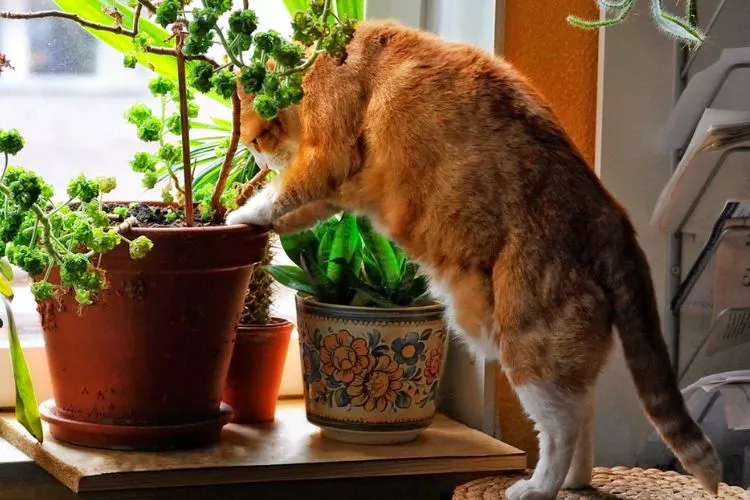
Remember to avoid overconcentration to prevent potential harm to your plants and the cats. Alternatively, you can use a vinegar and water mixture. Combine equal parts of white vinegar and water in a spray bottle and apply it around the plants.
Be cautious not to spray directly onto the plants as it can harm them. Commercial cat repellents are available on the market, too. Select a product that is non-toxic and environmentally friendly. Ensure to always follow the manufacturer’s instructions when applying any commercial product.
🐾 What do cats hate to walk on?
Cats generally dislike walking on surfaces that they perceive as unpleasant or uncomfortable. One of the most detested substances for them is aluminum foil.
Its unfamiliar texture and reflective surface deter cats to the point they would avoid areas covered with it. Another material that cats dislike is plastic, particularly when it’s used as a cover over surfaces. Cats also tend to avoid walking on sticky surfaces.
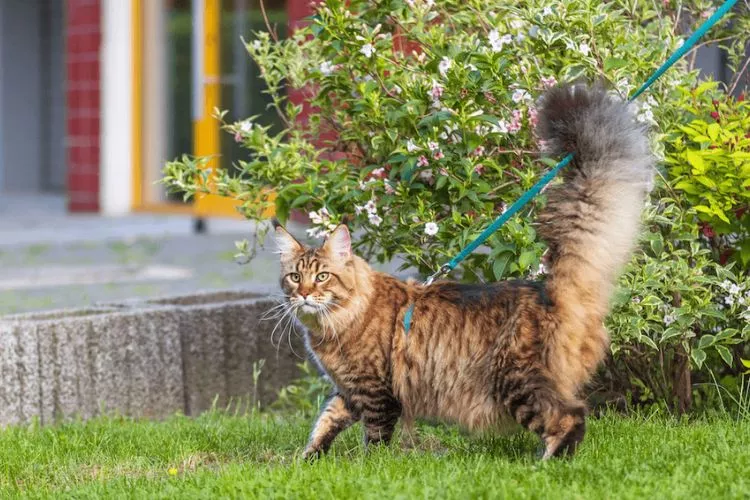
Additionally, slippery floors such as tiles or hardwood can be challenging for them. Surfaces which are too rough or too soft can also be discomforting to their sensitive paws.
Wet surfaces are generally avoided by cats. Implementing these materials in strategic areas of your garden can effectively deter cats from entering these zones.
Remember, while these methods can discourage cats, they should be used thoughtfully and humanely to prevent causing undue stress or harm to the animals.
🐾 frequently asked questions (FAQs)
Answer: Surprisingly, some cats are attracted to the smell of bleach rather than repelled by it. It’s thought that the chlorine in bleach chemically mimics scent markers in cat urine, enticing their curiosity. However, bleach can present health risks, so it shouldn’t be used as a cat deterrent.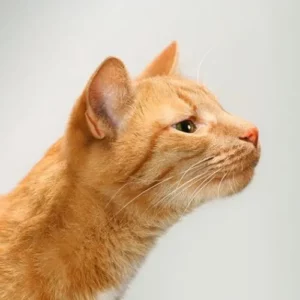
Answer: Vinegar can work as a deterrent to stop cats from defecating in your garden. Cats dislike the strong scent of vinegar. A solution of equal parts water and white vinegar can be sprayed around the garden perimeter to discourage visits. However, avoid direct application on plants as vinegar can harm them.
Answer: Yes, chilli powder can deter cats. The strong, spicy scent of chili powder can be unpleasant to cats’ sensitive noses. However, it should be used cautiously as it can irritate their eyes, noses, and skin, leading to discomfort. Pure chili powder can even lead to respiratory issues, so it’s not the most humane method.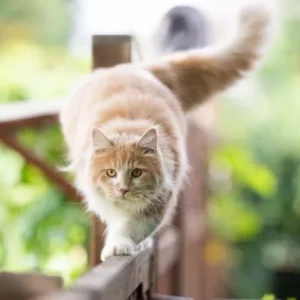
Answer: Jeyes fluid, a strong outdoor disinfectant, has been used as a cat deterrent due to its typically strong smell. However, this product may be harmful to cats, causing potential burns or other health problems. Use with extreme caution and avoid where possible.
Answer: Pepper can be used as a deterrent since cats dislike its smell and its irritating effect on their nostrils. Sprinkling some around your garden can discourage cats from entering these parts. Be mindful to use it sparingly as it may cause distress to the cats.
Answer: Cats dislike pooping on areas covered with citrus, vinegar, or pine scent as they find these smells quite off-putting. Any substance with these scents could deter them from using that area as a litter box. They also tend to avoid surfaces that have been treated with certain essential oils like lavender, peppermint, and citronella.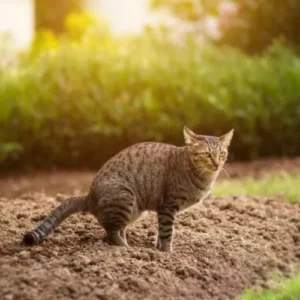
To know more about cat’s litter, read more here
Conclusion:
While bleach’s strong scent may intrigue some cats, it does not serve as an effective deterrent to stop them from pooping in the garden. What’s more, the potential health risks it presents to cats due to its toxic properties are a critical concern.
There are safer, more humane alternatives such as citrus peels, coffee grounds, vinegar, essential oils, and designated cat-friendly areas, which can assist in controlling cats’ toilet activities in your garden.
Above all, any form of control should entail respect and consideration for the cats’ wellbeing.
